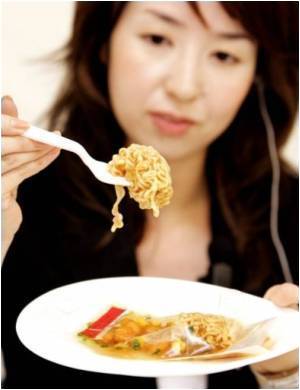At Yu Bo's restaurant, a delicious spread of tea-and-camphor-smoked duck, calligraphy brushes made of puff pastry and minced beef, awaits hungry customers.

The capital of Sichuan province -- a region known as the 'land of abundance' for its produce and famous for its beloved pandas -- plans to capitalise on a recent distinction from the UN's cultural body to attract the world's foodies.
"Sichuan food has so many flavours and cooking methods, which means that people from any country can enjoy it," said Yu, sitting in his restaurant which is modelled on official houses of the past, where diners had their own rooms.
Sichuan cuisine is one of eight major culinary traditions in China and is already well known abroad, with popular restaurants in London and New York serving up dishes with quirky names such as pock-marked old woman's tofu.
In February, UNESCO granted Chengdu the title of City of Gastronomy for "being the birthplace of many culinary traditions, home to a vibrant community of gastronomic professionals who are actively promoting innovation in food."
Gong Bao chicken, twice-cooked pork, Zhong dumplings in spicy, garlic sauce, and green beans in ginger sauce are some dishes popular with locals who enjoy food stalls on street corners just as much as more formal restaurants.
Advertisement
Wang Zhonglin, the vice-mayor of Chengdu, has said authorities aim to leverage the award to "build the city into an internationally-renowned gourmet capital".
Advertisement
Chengdu, which has already been the host of several gourmet festivals, also plans to try to attract foodies at an exhibition in Paris -- home to UNESCO headquarters -- later this year.
Food critics say Sichuan cuisine is misunderstood. Often known only for its special type of mouth-numbing pepper and spiciness, it encompasses a wide range of flavours native to a province almost as big as Thailand.
Fuchsia Dunlop, a London-based food writer and expert on Sichuan cooking, says the pleasure lies in the "rollercoaster ride" of flavours -- smoky, sweet and salty, gingery.
"The whole point is its contrast and excitement," she told AFP.
And according to Yu, who has travelled abroad to see how his native cuisine is served elsewhere, Sichuan food in other countries is misrepresented.
"It's all about pepper, more pepper, things with heavy flavours and lots of oil, but Sichuan dishes are not like that and people must make this known," he said.
Dunlop says plans to attract foreign foodies to Chengdu could hit a snag as a result of the constant redevelopment of the city, which has seen many quaint, old buildings replaced by modern high-rises.
"When I lived there in the 1990s, the whole city was a warren of little lanes with wooden houses and there were many street vendors and small snack shops," she said.
"There's not really any of that left, so whereas you might go to Italy and you can hang out in beautiful old cities while eating fine food, in China, it's just food."
Dunlop is also concerned that the tradition of rich home cooking is gradually being lost as the modern age creeps in.
"People used to eat so well at home -- the older generation were all making their own winter wind-dried sausages and bacon they would hang up on the eaves of the houses, they were all making their own pickles and preserves," she said.
"But what seems to happen now, the grandparents look after the children, and the adult, professional generation are all out in restaurants or being fed by their parents, and they're not learning how to cook."
Yu, however, says he is not going to let that happen to his own daughter.
"I teach my daughter to make breakfast every day when she gets up -- I'm training her, as I hope she will become a cook," he said.
Source-AFP










